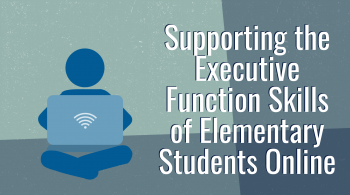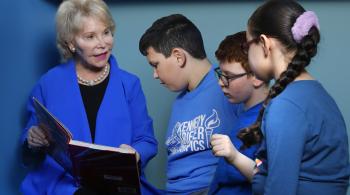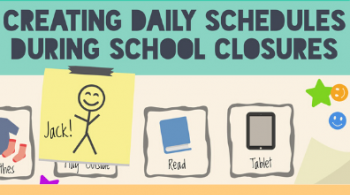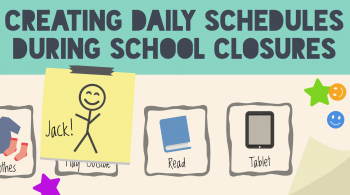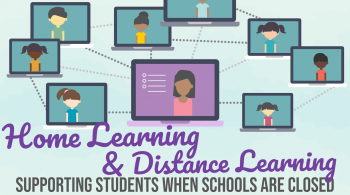12/27/16
What is it like for students returning to the classroom after experiencing a concussion? What practices do teachers engage in that make the situation worse and what are promising practices? We’ve created a few short vignettes to help illustrate what teachers can do to support students recovering from a mild traumatic brain injury.
Vignette #1: Stress makes it all worse.
Katie, a current ninth grader, is taking honors courses and typically earns A’s and B’s. She sustained a concussion following a collision with another player during soccer practice. Following the injury, she missed one week of school due to persisting symptoms (e.g., headache, fatigue, dizziness, etc.). Katie has returned to school, but is experiencing increased stress and anxiety regarding class time that she missed while she was out. She feels especially stressed with regard to her math and science classes, as the units continually build on each other, and now feels lost in class. Additionally, many of her teachers have mentioned that she has to complete make-up assignments and exams in addition to her normal workload. Katie is used to earning good grades, but now feels she has to work much harder than she used to in order to earn those same grades, partially due to ongoing symptoms. Due to the increased stress related to school, Katie’s headaches are beginning to increase, and she is spending time during the school day in the nurse’s office, which only perpetuates the missed instruction and increased stress.
How can the school and teachers help Katie?
- A point person in the school could help Katie work with all her teachers to develop a clear plan to make up missed assignments and exams. This should include excusing all non-essential assignments, and providing extended deadlines for essential assignments, which will allow Katie to catch up in all classes equally and in a reasonable, yet realistic time frame that is not overwhelming.
- Katie could speak with her teachers and set up times to receive the missed instruction during study hall periods or after school.
- Katie’s teachers could provide her with notes from the classes she missed. She may also be able to obtain these notes from another student in the class.
- Katie would mostly benefit from extended time to complete assignments and exams due to ongoing symptoms.
Vignette 2: When you were already struggling.
Johnny is currently enrolled in the eleventh grade; he is a C average student. He has a history of learning difficulties, and currently receives educational services for reading and writing through a 504 plan. Johnny sustained a concussion during a high school football game one month ago. Due to his desire to finish the football season, Johnny did not report the severity of his ongoing symptoms. Since the injury, Johnny has experienced daily headaches, sleep difficulties, increased emotionality (e.g., sadness, irritability, low frustration tolerance, etc.), and changes in concentration and memory. Both his parents and teachers report changes in Johnny’s mood and behavior. Over the past month, Johnny has missed several days of school due to his symptoms, his grades have continued to decline, and he has several “incompletes” regarding missed school assignments.
How can the school and teachers help Johnny?
- Johnny, his parents, and the school can set up a meeting to make any necessary modifications to his current 504 plan. This may include allowing extended deadlines or alternate assignments to address the current “zero” he has in several classes.
- Johnny should be permitted to carry a water bottle, eat snacks, and take breaks as needed throughout the day in order to help with headache management.
- In order to address cognitive changes since the concussion, teachers may consider modifying his classwork and require Johnny to only answer every other problem on assignments, or create personalized exams in order to reduce the workload, but still assess Johnny’s understanding and mastery of the instruction.
Vignette 3: Frustration and mood fluctuation shouldn’t be ignored.
Brad, currently enrolled in the sixth grade, is typically a straight A student and is highly involved in extracurricular activities, including the after school sports club and competitive swimming team. Brad was recently involved in a motor vehicle collision where he sustained a concussion, complicated by a skull fracture. Although most of Brad’s concussion symptoms have resolved, he continues to be restricted with regard to all contact physical activity due to the skull fracture. Therefore, Brad is not permitted to participate in recess or PE; rather, he is sitting in the nurse’s office during this time, which he describes as boring. Brad reports feeling frustrated and sad because he is unable to participate in these activities. On a few occasions, he has made comments about death and experienced anger outbursts. Since the concussion, he has failed several exams, been unable to complete assignments in the time allotted, and has made comments to his teacher that there is no point in doing school work.
How can the school and teachers help Brad?
- In order to address Brad’s mood concerns, the school can set up a daily check in- check-out procedure with a trusted point person, such as a nurse, teacher, social worker or guidance counselor, in order to monitor symptoms and mood changes.
- Rather than having Brad sit in the nurse’s office during recess or PE, he could use this time to meet with teachers and/or make up missed assignments. Under adult supervision, he could also spend time with friends on the playground during recess, or participate in some aspects of PE class, as long as he does not engage in physical activity with a risk of injury to the head (i.e., no ball activities, keep both feet on ground, no climbing playground equipment, etc.).
- Brad and his parents could also speak with the teachers for the classes that Brad failed exams in and/or has incomplete assignments due to determine if alternate assignments are possible.
Vignette 4: When going back to school isn’t the same as getting back to normal.
Amy has a history of attention deficit hyperactivity disorder (ADHD) and is currently enrolled in the fourth grade. She is prescribed stimulant medication daily, but does not receive educational services through an IEP or 504 plan. Amy sustained a concussion when she fell from the monkey bars while playing during recess. Following the injury, Amy experienced headache, fatigue, dizziness, and sensitivity to light and noise. She has also been feeling slowed down and mentally foggy. After several days of rest at home, she attempted to return to school, but left early due to exacerbation of symptoms, especially during recess and lunch.
How can the school and teachers help Amy?
- Amy will benefit from a gradual return to school in order to minimize symptom exacerbation and impairment and to rebuild her stamina. Amy’s parents and the school should work together to create a return to school plan, allowing her alternate attendance in academic subjects daily and gradually increasing partial days to full days at school. The plan should include a detailed explanation of excused non-essential assignments and a schedule to complete all essential make-up work with extended deadlines. Amy may also be able to utilize some time during the gradual return process to obtain missed instruction from teachers.
- As she recovers from her concussion, it would be beneficial for Amy to refrain from eating lunch in cafeteria or playing outside on the playground during recess due to persisting symptoms. She should be permitted to eat lunch in a quiet location and participate in quiet activities with a friend or two.
It is important for school teams to recognize that student rates of recovery from concussion are variable and that for some students; symptoms may persist longer than anticipated. Paying attention to and supporting students’ physical and emotional symptoms is important. By working as a team, teachers, school social workers, pyschologists, guidance counselors, nurses, and other school staff can help students recover without missing important instruction, falling behind, or having a dramatic impact on their academic achievement.







